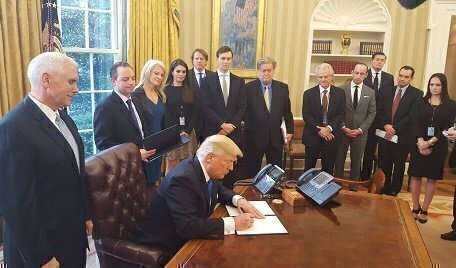The state of Hawaii and the Trump Administration have urged the U.S. Court of Appeals for the Ninth Circuit to bypass the usual step of a three-judge panel and assemble the full court to review President Trump’s revised immigration restrictions. If the court agrees, that could speed up review by that appeals court, and move the Hawaii case on toward the Supreme Court.
 Another federal appeals court, for the Fourth Circuit, has already taken this step in a case from Maryland, indicating the importance of the issues at stake and the courts’ desire to rule promptly on the constitutional controversy.
Another federal appeals court, for the Fourth Circuit, has already taken this step in a case from Maryland, indicating the importance of the issues at stake and the courts’ desire to rule promptly on the constitutional controversy.
There is a significant difference between the two cases as they reached the appeals court level. The Hawaii case involves a challenge to both of the most significant parts of the Trump executive order – the plan for a 90-day suspension of entry of any foreign nationals from a list of six Mideast nations, and a plan for a 120-day suspension of entry of any refugees from anywhere in the world. The Maryland case involves only the 90-day halt aimed at the six designated nations.
The cases are alike in that the two District Court trial judges issued nationwide orders barring the federal government from enforcing the provisions on which those judges ruled. And, in both, the judges ruled that the challengers were likely to ultimately get the executive order provisions struck down as a form of “Muslim ban” – that is, a ban on entry of Muslims based on discrimination against their religion.
In the Ninth Circuit, there are 24 active judges who have the right to vote on whether to put a case before the en banc court, and it would take a majority of those judges to agree to do so. Actual en banc review in that Circuit Court, however, is usually before 11 judges, not all 24. In the Fourth Circuit, it took a majority of its 15 active judges to skip the three-judge panel, and all 15 will take part in en banc review.
The Fourth Circuit Court has scheduled a hearing in the Maryland case for May 8, and the Ninth Circuit Court has planned to hold a hearing on the Hawaii case on May 15.
In each of the cases, the Trump Administration, aside from challenging the judges’ rulings against the legality of the immigration limits, has asked the courts to permit enforcement of the provisions while the appeal goes forward. One or both of the courts could rule on that preliminary issue even before the scheduled hearings, and that could send the enforcement issue quickly to the Supreme Court for action. If either side does seek review of a Circuit Court ruling on the enforcement question, it would take the votes of five of the nine Justices to overturn the result. The Supreme Court now has a full bench, since the arrival this week of Justice Neil M. Gorsuch.
Legendary journalist Lyle Denniston is Constitution Daily’s Supreme Court correspondent. Denniston has written for us as a contributor since June 2011 and has covered the Supreme Court since 1958. His work also appears on lyldenlawnews.com, where this post first appeared.
Sign up to receive Constitution Weekly, our email roundup of constitutional news and debate, at bit.ly/constitutionweekly







